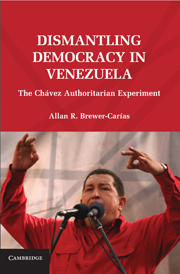Book contents
- Frontmatter
- Contents
- AUTHOR'S NOTE
- INTRODUCTION DEFRAUDING DEMOCRACY THROUGH NONCONSENSUAL CONSTITUENT ASSEMBLIES
- PART ONE THE POLITICAL ASSAULT ON STATE POWERS AND THE FRAMEWORK FOR AUTHORITARIANISM
- PART TWO INSTITUTIONAL DEVELOPMENT TOWARD CONSOLIDATING AUTHORITARIANISM
- PART THREE CONSTITUTIONAL REFORMS DESIGNED TO CONSOLIDATE AUTHORITARIANISM
- Chapter 10 THE FAILED ATTEMPT TO CONSOLIDATE AN AUTHORITARIAN AND ANTIDEMOCRATIC POLITICAL SYSTEM IN THE CONSTITUTION
- Chapter 11 THE FAILED ATTEMPT TO CONSOLIDATE A CENTRALIZED STATE IN THE CONSTITUTION
- Chapter 12 THE FAILED ATTEMPT TO CONSOLIDATE A SOCIALIST CENTRALIZED ECONOMIC SYSTEM IN THE CONSTITUTION
- Chapter 13 THE IRREGULAR FRAUDULENT IMPLEMENTATION OF THE REJECTED CONSTITUTIONAL REFORM THROUGH LEGISLATION
- Chapter 14 THE ILLEGITIMATE MUTATION OF THE CONSTITUTION THROUGH JUDICIAL CONSTITUTIONAL INTERPRETATION
- Chapter 15 THE ALTERNATE PRINCIPLE OF GOVERNMENT AND THE 2009 CONSTITUTIONAL AMENDMENT ON CONTINUOUS REELECTION
- FINAL REFLECTIONS: THE RIGHT TO DEMOCRACY AND ITS VIOLATION BY VENEZUELA'S AUTHORITARIAN GOVERNMENT: SOME RELEVANT FACTS FROM THE PAST DECADE
- INDEX
Chapter 12 - THE FAILED ATTEMPT TO CONSOLIDATE A SOCIALIST CENTRALIZED ECONOMIC SYSTEM IN THE CONSTITUTION
Published online by Cambridge University Press: 05 June 2012
- Frontmatter
- Contents
- AUTHOR'S NOTE
- INTRODUCTION DEFRAUDING DEMOCRACY THROUGH NONCONSENSUAL CONSTITUENT ASSEMBLIES
- PART ONE THE POLITICAL ASSAULT ON STATE POWERS AND THE FRAMEWORK FOR AUTHORITARIANISM
- PART TWO INSTITUTIONAL DEVELOPMENT TOWARD CONSOLIDATING AUTHORITARIANISM
- PART THREE CONSTITUTIONAL REFORMS DESIGNED TO CONSOLIDATE AUTHORITARIANISM
- Chapter 10 THE FAILED ATTEMPT TO CONSOLIDATE AN AUTHORITARIAN AND ANTIDEMOCRATIC POLITICAL SYSTEM IN THE CONSTITUTION
- Chapter 11 THE FAILED ATTEMPT TO CONSOLIDATE A CENTRALIZED STATE IN THE CONSTITUTION
- Chapter 12 THE FAILED ATTEMPT TO CONSOLIDATE A SOCIALIST CENTRALIZED ECONOMIC SYSTEM IN THE CONSTITUTION
- Chapter 13 THE IRREGULAR FRAUDULENT IMPLEMENTATION OF THE REJECTED CONSTITUTIONAL REFORM THROUGH LEGISLATION
- Chapter 14 THE ILLEGITIMATE MUTATION OF THE CONSTITUTION THROUGH JUDICIAL CONSTITUTIONAL INTERPRETATION
- Chapter 15 THE ALTERNATE PRINCIPLE OF GOVERNMENT AND THE 2009 CONSTITUTIONAL AMENDMENT ON CONTINUOUS REELECTION
- FINAL REFLECTIONS: THE RIGHT TO DEMOCRACY AND ITS VIOLATION BY VENEZUELA'S AUTHORITARIAN GOVERNMENT: SOME RELEVANT FACTS FROM THE PAST DECADE
- INDEX
Summary
In addition to the aforementioned reform proposals sanctioned by the National Assembly in 2007 regarding the organization of the State, the rejected 2007 constitutional reform also sought to transform the sociopolitical foundations of the state's order of mixed economy, establishing instead a Socialist system.
According to the trends in constitutionalism developed since the middle of the past century, the economic constitution of Venezuela has been established on the model of the mixed economy, which is based on the principle of liberty as opposed to the directed economy – this is similar to the economic models of all Western nations. This economic system, then, is founded on economic liberty, private initiative, and free competition, without excluding the participation of the state as a promoter of economic development, regulator of economic activity, and planner together with the civil society.
Following this orientation, the 1999 Constitution establishes a mixed economic system, a social market economy. This is an economic system that is based on economic liberty but must be developed according to principles of social justice – therefore, it requires the intervention of the state. This socioeconomic regime, in accord with Article 299 of the Constitution, rests on the following principles: social justice, democratization, efficiency, free competition, environmental protection, productivity, and solidarity. These aim to ensure comprehensive human development, existence with dignity, and the maximum benefit for the collective.
- Type
- Chapter
- Information
- Dismantling Democracy in VenezuelaThe Chávez Authoritarian Experiment, pp. 311 - 328Publisher: Cambridge University PressPrint publication year: 2010



